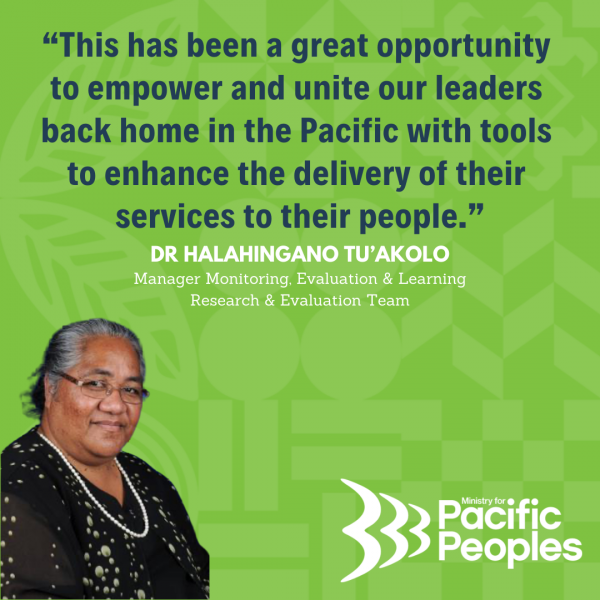Research helps people understand Pacific acts of service
Research helps people understand Pacific acts of service

Leading the Ministry for Pacific Peoples Pacific Economic Research Project, Dr Halahingano Tu’akolo Rohorua is learning more every day about who she is, and why she has been called to serve Pacific Aotearoa.
Research on the contribution of Pacific peoples to the New Zealand economy is largely untouched, and this is something MPP is striving to address with the Pacific Economic Research Project, facilitated by the Ministry’s Director of Research and Evaluation Dr Ana Koloto.
Dr Hala Rohorua is the Project Lead and says the purpose of the research project is to better understand the Pacific informal economy, with a particular focus on exploring the type of unpaid productive work and volunteering that contribute to Pacific wellbeing and wealth development in New Zealand.
“The research will provide insights and improved understanding of Pacific worldviews on volunteering and unpaid productive work, and it is integral to informing MPP’s strategic actions that sit under one of the key goals of the Pacific Aotearoa Lalanga Fou - Prosperous Pacific Communities,” Dr Hala says.
“In this regard, it is important Pacific volunteer contribution to Aotearoa is duly recognised, celebrated and fully appreciated.”
The findings from this research project will be published in a report mid-2021, which will enhance understanding and knowledge of Pacific volunteering, wealth and wellbeing, and the characteristics of their contribution to the Aotearoa New Zealand economy both pre- and post-COVID-19.
Of Tongan and Solomon Islands ethnicity, Dr Hala says she is proud to be the voice for the minority Pacific groups yet to be included in the Pacific waka.
“Kirikiriroa has been my home for the past 20 years, and I have been involved in academia for most of my working life, teaching Economics and Accounting at the University of Waikato and as the Pacific Principal Researcher for the Pacific Labour Mobility Project for almost 17 years.”
The Pacific Labour Mobility project findings have impacted hugely on the implementation of different Labour mobility schemes such as the Pacific Access Category, Skilled Migrants Category and the Seasonal Workers’ Scheme both here in New Zealand and in Australia, she adds.
During the last five years, Dr Hala has spent time giving back to the Pacific region – leading the delivery of the Master of Business Administration (MBA) programme through the Graduate School of Business of the University of the South Pacific (USP).
“This has been a great opportunity to empower and unite our leaders back home in the Pacific with tools to enhance the delivery of their services to their people.
“Before I left USP in August 2020, my popao (canoe) loaded with my MBA tools had reached the shores of Tuvalu, Kiribati, Samoa, Tonga, Vanuatu, Solomon Islands, Cook Islands, Marshall Islands, Labasa and Lautoka in Fiji and Niue.
“I also completed the design of a new Doctorate in Business Administration (DBA) for the USP which was approved by the University Council to commence in trimester one, 2021.”
It was during 2020, when COVID-19 first impacted New Zealand, when Dr Hala realised, she needed to support Pacific communities in Aotearoa, and she returned to Aotearoa.
Fortunately, MPP has provided a great platform for her to continue to be of service to Pacific peoples, she says.
“The Ministry is a stage from which our Pacific peoples’ voices can be heard.
“The design of the sampling frame for the Pacific Economy Research project ensures everyone will be included, thus factoring in our Pacific population diversity in terms of ethnicity, gender, age and geographical distribution in Aotearoa.”
The Ministry is currently asking Pacific people to complete a survey, which takes approximately 15 minutes, to inform the research project.
“The more Pacific people take part in the survey, the more representative the survey will be for the Pacific communities in New Zealand,” Dr Hala says.
Already the project has been rewarding for the large team of MPP and community researchers involved, and Dr Hala says a highlight has been engaging with community members at focus group meetings which are familiar, inclusive and culturally appropriate.
“Interestingly, none of the target nine ethnic groups has a term or word in their language which defines volunteering.”
The process has made individuals ponder their unique contribution to the economy, and their respective Pacific cultures, rooted with serving others.
